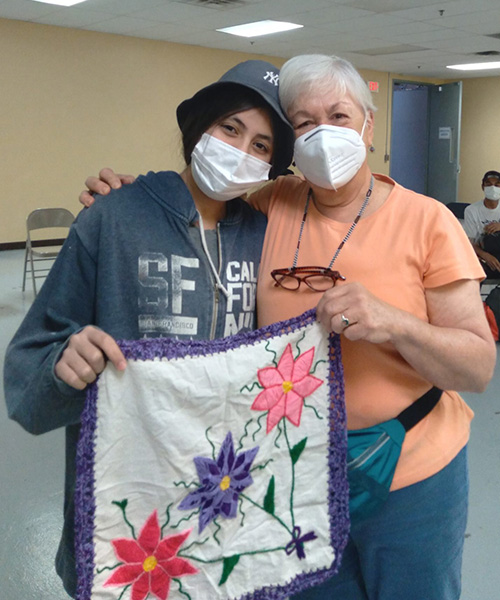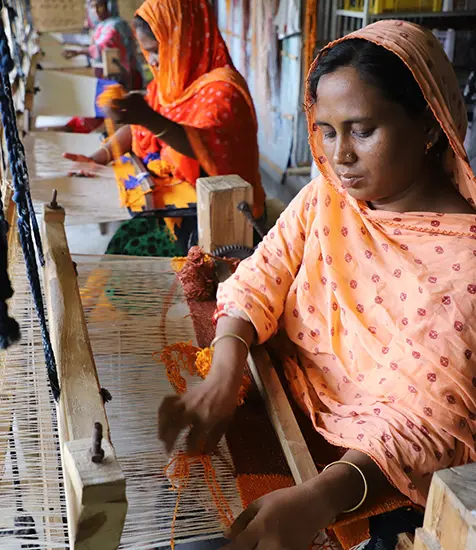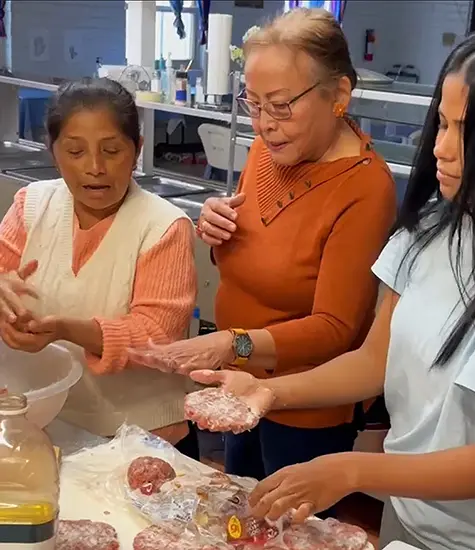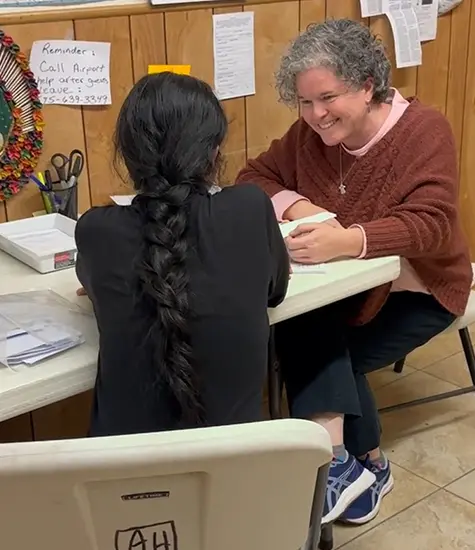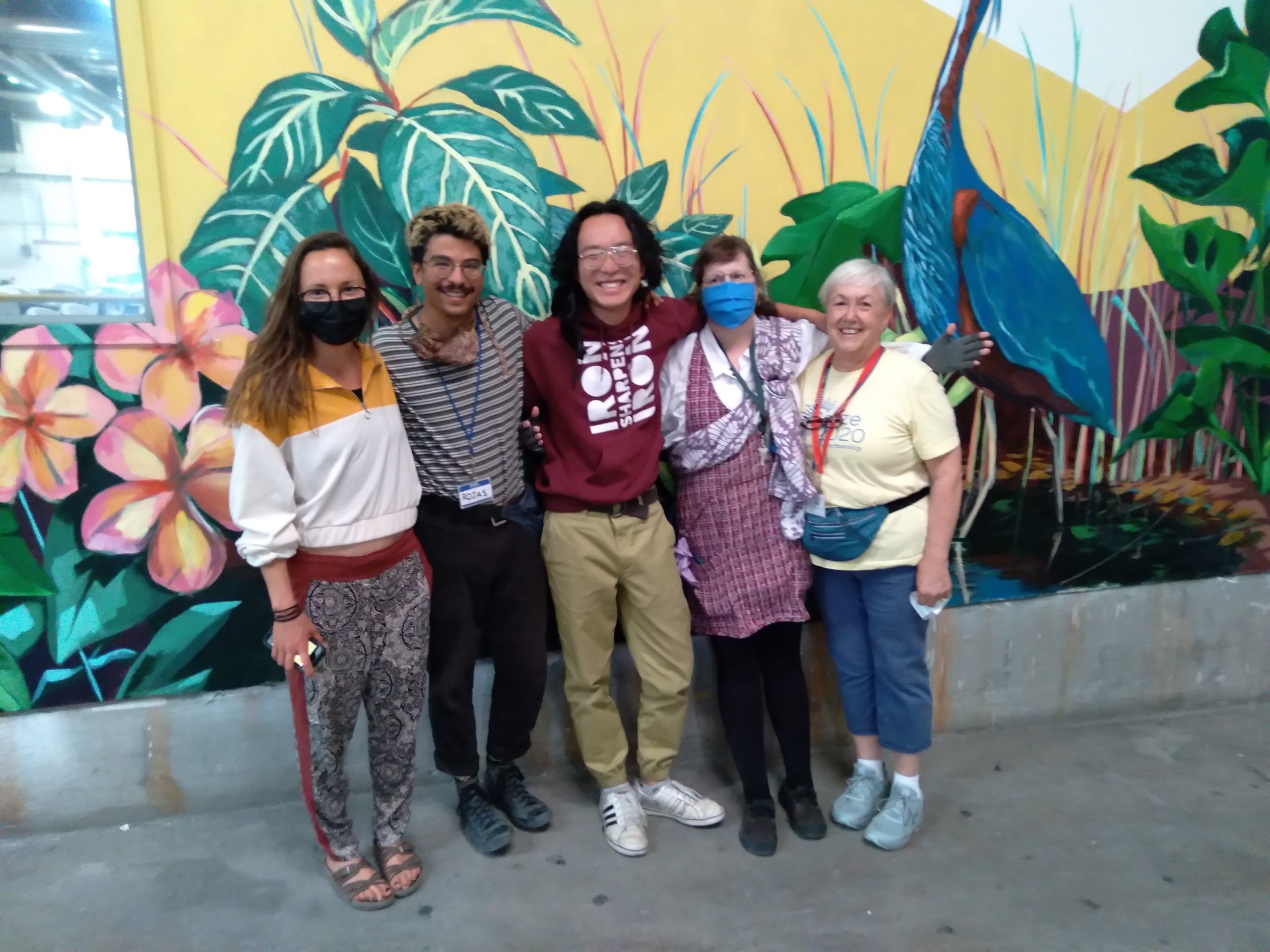
Vicki (right) with a group of volunteers at Casa del Refugiado in El Paso, Texas.
In March, I received a message from a friend who told me that Annunciation House needed volunteers in El Paso at the U.S.-Mexico border. I had previously volunteered at Annunciation House, which provides short respite for migrants, typically one to three days, as they await travel to their sponsors’ homes in the U.S.
On this visit I was assigned to work at Casa del Refugiado — a large warehouse converted into a house of hospitality and shelter that can accommodate up to 500 people; the largest number of migrants we received was 200 one day, and the lowest was 70.
Why do they come?
Refugees who come to our border seeking asylum come because their backs are against the wall. The true value for me while at Casa del Refugiado was being able to see and hear the perspective of those who had to be on the move. These are some of the factors that put them in motion:
- Fleeing violence: from forced gang recruitment and sexual or gender-based violence. A woman from Nicaragua started to cry as she mentioned how long it took with her children to arrive at the border and then wait for over a year in a shelter on the other side of the border in Ciudad Juárez (as a result of our government’s Migrant Protection Protocols).
- Fleeing extortion and threats of violence from organized crime and drug cartels: A father fled with his wife and children after he was told to pay a certain amount of income from his business because “we know you have a son. We know how old he is, where he goes to school and what he wore today. We know who takes him to school.” He told the Casa del Refugiado volunteer, “People in the United States don’t know what it like is to leave everything behind.”
- Climate migration: Two category 5 Hurricanes, Eta and Iota, two weeks apart, destroyed homes, farms, killed livestock and agricultural products. A woman from Honduras showed me a picture on her cell phone of her flooded home. I asked how she was able to escape and she told me she got to a boat and lived on it for four days. (I imagined a rowboat). In other parts of the Northern Triangle countries (El Salvador, Guatemala, Honduras) there is a severe and prolonged drought. People are no longer able to sustain a livelihood by providing food for their families.
- Poverty: Very often this is a constant that afflicts people on the move…socio-economic instability with the majority of people living below the poverty line.
Encounters of mutual blessing
Every day a mutuality of graces seemed to overflow through encounters with guests and volunteers alike. As our guests entered a safe space, we offered them food, cots, clean clothes and showers. Most importantly our work was to contact their sponsoring family or friend to arrange transportation from El Paso to their destination city. The most powerful contrasts were in their faces when people arrived and when they left us.
Once welcomed, we brought them inside and began the intake process. While collecting information needed for their stay overnight and pending travel, I would hear many stories of hardship and horrendous indignities suffered. To share just a few:
- An older Honduran woman called her 29-year-old daughter, Kathleen, now living in New Jersey, whom she had not seen since she was 18. Her daughter now has a 9-year-old child. We shared tears as she related her story, telling me that she no longer wants to dwell on the horrific past three years in Juárez — homeless on the streets and in shelters. After speaking by phone with her daughter and passing the phone to me, Kathleen was also overwhelmed with emotion, sharing more tears of joy and relief! The next day the mother flew from El Paso to New Jersey to be reunited after 12 years with her daughter and to meet her granddaughter for the first time!
- A timid woman from Guatemala with a son and baby of just 7 months, heading to North Carolina to be reunited with her husband and two older daughters.
- The anguished tale of a grandmother who left her home country with her 11-year-old granddaughter. That very morning, border patrol had separated them. The grandmother was bereft and filled with anxiety. After consulting with our coordinators, I was told that the child had likely been taken by ORR (Office of Refugee and Resettlement), and it typically could take 30 days before they are reunited. When I learned there was nothing we could do, we then made the dreaded phone call to the mother of the child and daughter of the woman with us. The grandmother left the next morning for Florida, so she and her daughter could wait together.
- A beautiful Mexican family that included a mother and her four daughters were on their way to her sister’s home in California. When I asked her if the children’s’ father would be joining them, she told me that her husband had been murdered in Juárez. She said this with no show of emotion but held my hand tightly while completing the forms and before calling her sister with news of their arrival.
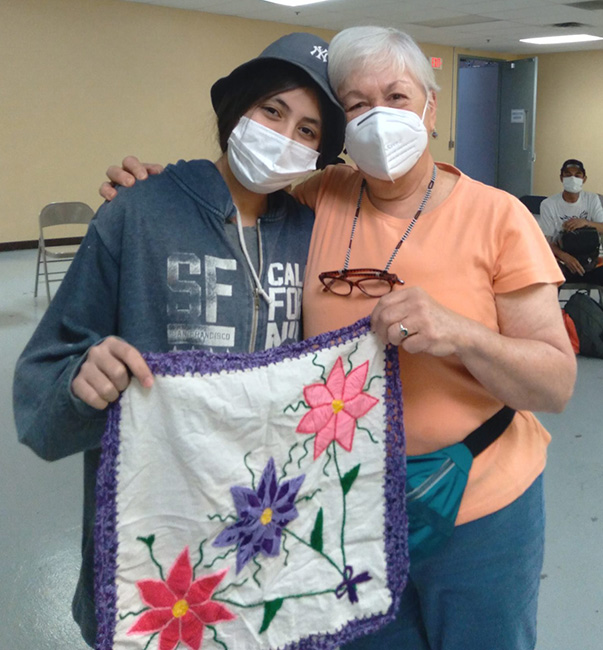
Vicki Simon with Gabi and her present.
Next, we prepared guests for the night with cots, bedding, toiletries and towels. The office phones were buzzing with ticket information from sponsors. Once confirmed, there were many phases in preparing them for departures: family contact, notification of departures, and then finally the big day they had been awaiting for years. We would meet those leaving in the Salidas (departures) Room to give them their ticket information and a travel bag with food and water for their trips; blankets for some traveling by bus for days to their final destination.
Salidas / departures
One day while in the Salidas Room preparing folks for their journey, a young Honduran teenager named Gabi presented me with a gift — a beautiful hand crocheted pillow cover that she made while being held with in a Juárez shelter. I was so surprised; she said it was for all the kindnesses and care we had offered them while there. She was traveling with her father and her brother, on their way to the Bronx to stay with their aunt. I treasure this unexpected gift, and often wonder how they are doing.
My favorite part of our times together was accompanying our guests to the shuttle buses taking them to either the airport or bus station. When they boarded these shuttle busses, we would hug and wave and shout to one another, “Que le vaya bien. Dios les bendiga.” Now, on this next leg of their long journey, their smiling faces were wearing palpable signs of hope!

